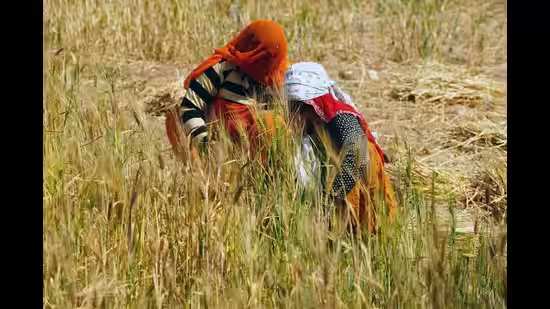Govt plans to double down on rice, millet stocking amid heat threat to wheat yield

To tide over any shortage, the government has doubled down on paddy purchases and has asked states that grow millets to draw up elaborate networks to buy the hardy cereals. The central government, aware of the high chances of heatwaves over food-bowl states and their potential impact on the wheat harvest, will get by with enough stock of rice and millets to meet the country’s food security needs, according to procurement plans put in place.
The government aims to procure 34.1 million tonne of wheat at federally determined prices. Even if rising temperatures do impact wheat output, as they did last year, estimates are available on the extent to which yields could drop, an official said, seeking anonymity.Read More : Japan to keep imported wheat price unchanged despite inflation To tide over any shortage, the government has doubled down on paddy purchases and has asked states that grow millets to draw up elaborate networks to buy the hardy cereals. Millets have been at the centre of India’s campaign this year to promote their consumption globally.
Until March 1, the government has bought 71.3 million tonne of paddy, paying farmers ₹1.4 lakh crore in support prices, according to official data.
Authorities have targeted to purchase 76.6 million tonne of summer-sown paddy (equivalent to 51.4 million tonne of rice). Of winter-sown paddy, they plan to buy 15.8 million tonne (equivalent to 10.6 million tonne of rice). Together, the government’s paddy stockpile is expected to be 90 million tonne, official projections show.
A heatwave will surely cut wheat yields but the government’s food-management plan hinges on careful allocation of rice, wheat and even millets to meet the country’s food security needs, which includes free grains for 800 million people, the official said.
Last year, state purchases of wheat were abnormally low at 18 million tonnes, down nearly 58% from the previous year after a disastrous spell of heatwave cut output by 2.5% to 106 million tonnes.
The country is watching out for extreme weather as both the India Meteorological Department and private forecasters have predicted high chances of a heatwaves in March through May that could roil the farm economy amid rising prices of staples such as rice and wheat.
To control rising cereal prices, the Centre last month decided that the Food Corporation of India will sell 3 million tonnes in the market through e-auctions. On February 21, it said it would auction 2 million tonnes more.
India has decided not to reopen the export of wheat or remove curbs on the overseas sale of rice, at least until its own wheat purchases for state-held stocks are over. The move comes amid higher overall consumer inflation, which hit a three-month high of 6.52% in January, mainly because of higher food prices. An inflation rate higher than 6% is considered to be above the Reserve Bank of India’s tolerance range of 4-6%.
The government aims to procure 34.1 million tonne of wheat at federally determined prices. Even if rising temperatures do impact wheat output, as they did last year, estimates are available on the extent to which yields could drop, an official said, seeking anonymity.
Until March 1, the government has bought 71.3 million tonne of paddy, paying farmers ₹1.4 lakh crore in support prices, according to official data.
Authorities have targeted to purchase 76.6 million tonne of summer-sown paddy (equivalent to 51.4 million tonne of rice). Of winter-sown paddy, they plan to buy 15.8 million tonne (equivalent to 10.6 million tonne of rice). Together, the government’s paddy stockpile is expected to be 90 million tonne, official projections show.
A heatwave will surely cut wheat yields but the government’s food-management plan hinges on careful allocation of rice, wheat and even millets to meet the country’s food security needs, which includes free grains for 800 million people, the official said.
Last year, state purchases of wheat were abnormally low at 18 million tonnes, down nearly 58% from the previous year after a disastrous spell of heatwave cut output by 2.5% to 106 million tonnes.
The country is watching out for extreme weather as both the India Meteorological Department and private forecasters have predicted high chances of a heatwaves in March through May that could roil the farm economy amid rising prices of staples such as rice and wheat.
To control rising cereal prices, the Centre last month decided that the Food Corporation of India will sell 3 million tonnes in the market through e-auctions. On February 21, it said it would auction 2 million tonnes more.
India has decided not to reopen the export of wheat or remove curbs on the overseas sale of rice, at least until its own wheat purchases for state-held stocks are over. The move comes amid higher overall consumer inflation, which hit a three-month high of 6.52% in January, mainly because of higher food prices. An inflation rate higher than 6% is considered to be above the Reserve Bank of India’s tolerance range of 4-6%.
Source: www.hindustantimes.com
Useful Links:
